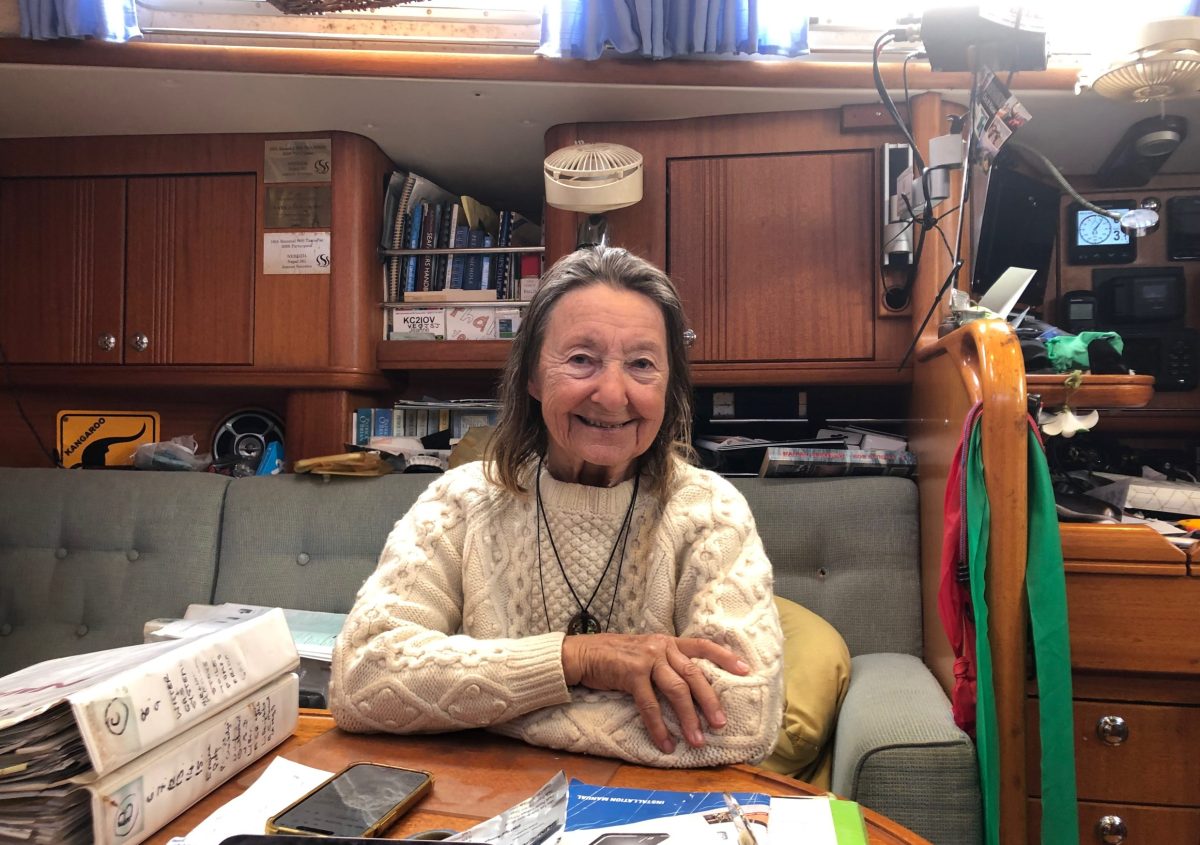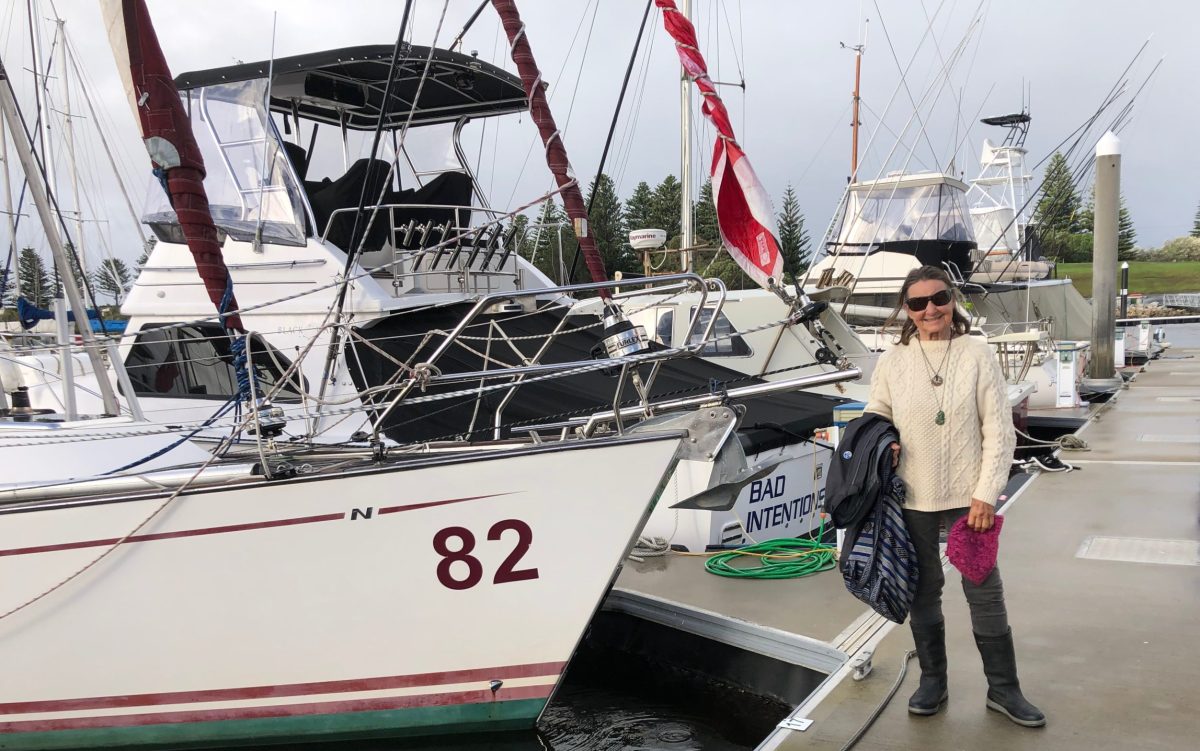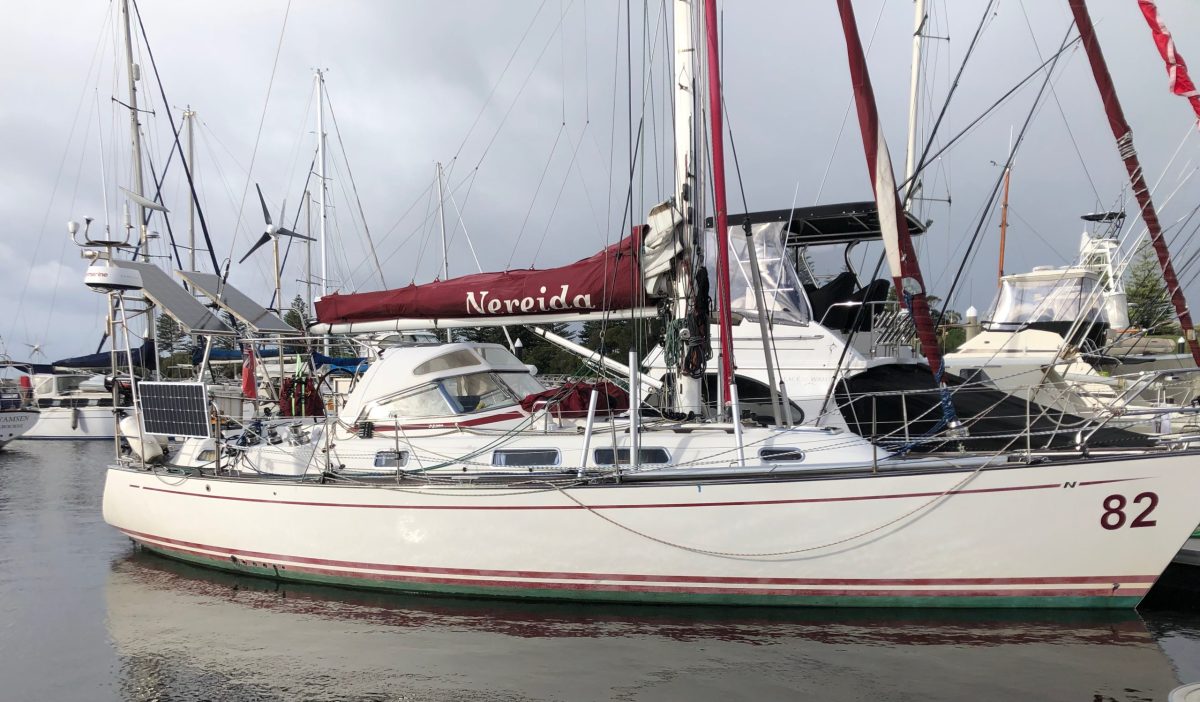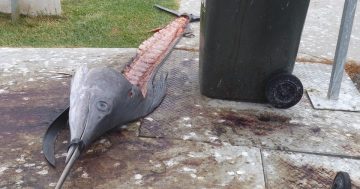
British sailor Jeanne Socrates holds several world records for circumnavigating the globe nonstop, solo, and unassisted. Photos: Marion Williams.
Legendary sailor Jeanne Socrates and her 11.55-metre sailing vessel Nereida took shelter in Bermagui from the storm in late March.
The Englishwoman is the oldest person to sail solo, nonstop, unassisted around the world via the Southern Ocean’s notorious five Great Capes, and the first woman to circumnavigate the world solo, nonstop and unassisted from North America.
Nonstop means not setting foot on land at any time, so carrying all food and provisions on board. Unassisted means no practical help from any other person or craft, nor using the engine. The engine is sealed before she sets sail and is checked on her return.
While the spry 82-year-old is as fit and capable as ever, the engine of the 16-year-old Najad 380 vessel will be rebuilt in Sydney in April.
Ms Socrates first stepped into a dinghy in 1990 at the age of 48. Four years later, she did a course on yachting, thinking it would be boring. She has been hooked since.
Her first successful nonstop circumnavigation started in British Columbia, Canada, in October 2012 and finished there in July 2013. That was more than 25,700 nautical miles and almost 260 days of sailing around the world, including more than three months in the mighty Southern Ocean.
Ms Socrates’ second successful attempt began five years later, in October 2018, and was completed in September 2019. That voyage made her the oldest person, male or female, to sail solo around the world nonstop and unassisted via all five southernmost capes of the Southern Ocean.
Sailing via those capes is significant because conditions are rougher in the Southern Ocean, and the temperature in her cabin on Nereida can fall to five degrees.
“I can’t afford to waste diesel on heating,” Ms Socrates said. “The diesel is used for battery power for instruments and the radio.”
Ms Socrates has literally sailed around the world four times. She was inducted into the prestigious Cape Horn Hall of Fame in September 2023.

Legendary sailor Jeanne Socrates took shelter from the storm in Bermagui in late March and early April.
Ms Socrates left England in Nereida in June 2009. Her current voyage began in Canada in September 2022 and has taken her down to Mexico, and across to Polynesia and New Zealand.
Ocean sailing exerts a strong pull on her.
“It is too enjoyable not to keep doing it,” Ms Socrates said as the rain and wind lashed Nereida in Bermagui Harbour on Monday (31 March). “It is a wonderful life.
“You are out in the middle of the ocean, big seas, birds and big skies. It is pretty spiritual being out there.”
It can also be scary. On one occasion at sea, Ms Socrates had to climb the 15.63-metre-high mast to replace a part. She had to stop twice. Even being tied to the mast, her forearms ended up bruised and her hands blistered.
Vital to her success and safety is having a sturdy boat and being prepared for the worst situation. When Nereida was being prepared, she would ask what would happen when it tipped upside down, not if.
Another big part of her life on the seas is the people she has met. They keep in contact via radio, Facebook, and Instagram.
“It is a wonderful, supportive community,” she said.

The 38-foot Nereida was built on the Swedish island of Orust and launched from England in 2009. Her predecessor Nereida ended up on a sandy beach in Mexico when Jeanne Socrates was half a day away from finishing a 15-month circumnavigation.
The clearly resourceful Ms Socrates circumnavigated Australia by land in a campervan during the COVID-19 lockdown.
She was in Australia to find out more about some of her Falkiner family. The Falkiner family is famous for sheep breeding in the Riverina.
Lawre Falkiner married Colonel John Mansel Bruce Steer. They were responsible for Bermagui’s netted saltwater pool. Colonel Steer was also instrumental in the construction of the seawall.
They had moved to Bermagui in the late 1940s after he had served in World War II.
So, while waiting for calmer waters, Ms Socrates visited the Bermagui Historical Society to learn more about her aunt and uncle.
When Ms Socrates embarked on her second successful solo, nonstop, unassisted circumnavigation she thought she would do it faster than the first one. It actually took three months longer.
That was partly because she had a badly damaged mainsail in the Southern Ocean. “It took from the Falklands to New Zealand to fix that.”
Another contributing factor was climate change.
“There were all these storms coming from South America,” Ms Socrates said. “There is definitely more stormy weather, and it is more unpredictable.”
While technology has improved communications, it has not made sailing around the world any easier.
“You still have to sail the boat, so technology is irrelevant,” Ms Socrates said. “You still have to contend with whatever the elements chuck at you.”








